Hemoglobin D Punjab (HbD) Mutation Study Test
Welcome to DNA Labs UAE, a leading genetic lab in the UAE. We offer a wide range of genetic tests, including the Hemoglobin D Punjab (HbD) Mutation Study Test. In this blog post, we will provide you with detailed information about this test, including its cost, symptoms, diagnosis, and more.
Test Name: Hemoglobin D Punjab (HbD) Mutation Study Test
Components:
- Sterile container
- Sterile Normal Saline Container
- EDTA Vacutainer (2ml)
Price: 1200.0 AED
Sample Condition:
The Hemoglobin D Punjab (HbD) Mutation Study Test can be performed using amniotic fluid, chorionic villi, or cord blood as the sample.
Report Delivery: 7-8 days
Method: End Point PCR
Test Type: Genetics
Doctor: General Physician
Test Department:
Pre Test Information:
A prescription from a doctor is required to perform the Hemoglobin D Punjab (HbD) Mutation Study Test. However, the prescription is not applicable for surgery and pregnancy cases or for people planning to travel abroad.
Test Details
The Hemoglobin D Punjab (HbD) mutation is a genetic variant of hemoglobin, the protein responsible for carrying oxygen in red blood cells. This mutation is specific to the Punjab region in India. The HbD mutation is characterized by a single amino acid substitution in the beta-globin gene.
The normal hemoglobin molecule consists of two alpha-globin chains and two beta-globin chains. In individuals with the HbD mutation, the amino acid glutamic acid is replaced by glutamine at position 121 of the beta-globin chain. This mutation can lead to a variety of health effects, depending on the specific genetic background of the individual.
Some individuals may be asymptomatic carriers, meaning they have the mutation but do not experience any symptoms. Others may have mild to moderate symptoms, such as mild anemia or a slightly increased risk of blood clots. In rare cases, individuals with the HbD mutation may develop a condition called hemoglobin D disease, which is characterized by more severe symptoms including chronic anemia, jaundice, and an enlarged spleen.
Hemoglobin D disease is inherited in an autosomal recessive manner, meaning that both parents must carry the mutation for their child to be affected. Research on the HbD mutation has focused on understanding its molecular and cellular effects, as well as its clinical manifestations.
Studies have investigated the prevalence of the mutation in different populations, the molecular mechanisms underlying its effects on hemoglobin function, and the clinical management of individuals with HbD disease. Overall, the study of the HbD mutation has contributed to our understanding of the genetic basis of hemoglobin disorders and has implications for the diagnosis and treatment of affected individuals.
For more information about the Hemoglobin D Punjab (HbD) Mutation Study Test or to schedule an appointment, please contact DNA Labs UAE.
| Test Name | Hemoglobinb D PunjabHbD Mutation Study Test |
|---|---|
| Components | Sterile container / Sterile Normal Saline Container / EDTA Vacutainer (2ml) |
| Price | 1200.0 AED |
| Sample Condition | Amniotic fluid \/ Chorionic villi \/ Cord blood |
| Report Delivery | 7-8 days |
| Method | End Point PCR |
| Test type | Genetics |
| Doctor | General Physician |
| Test Department: | |
| Pre Test Information | Hemoglobinb D Punjab(HbD) Mutation Study can be done with a Doctors prescription. Prescription is not applicable for surgery and pregnancy cases or people planing to travel abroad. |
| Test Details |
The Hemoglobin D Punjab (HbD) mutation is a genetic variant of hemoglobin, the protein responsible for carrying oxygen in red blood cells. This mutation is specific to the Punjab region in India. The HbD mutation is characterized by a single amino acid substitution in the beta-globin gene. The normal hemoglobin molecule consists of two alpha-globin chains and two beta-globin chains. In individuals with the HbD mutation, the amino acid glutamic acid is replaced by glutamine at position 121 of the beta-globin chain. This mutation can lead to a variety of health effects, depending on the specific genetic background of the individual. Some individuals may be asymptomatic carriers, meaning they have the mutation but do not experience any symptoms. Others may have mild to moderate symptoms, such as mild anemia or a slightly increased risk of blood clots. In rare cases, individuals with the HbD mutation may develop a condition called hemoglobin D disease, which is characterized by more severe symptoms including chronic anemia, jaundice, and an enlarged spleen. Hemoglobin D disease is inherited in an autosomal recessive manner, meaning that both parents must carry the mutation for their child to be affected. Research on the HbD mutation has focused on understanding its molecular and cellular effects, as well as its clinical manifestations. Studies have investigated the prevalence of the mutation in different populations, the molecular mechanisms underlying its effects on hemoglobin function, and the clinical management of individuals with HbD disease. Overall, the study of the HbD mutation has contributed to our understanding of the genetic basis of hemoglobin disorders and has implications for the diagnosis and treatment of affected individuals. |








